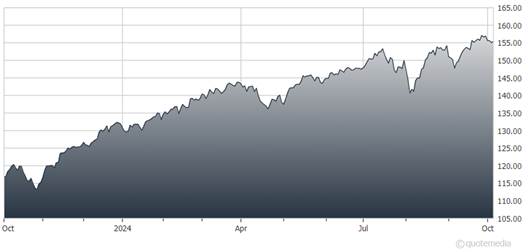Diversification is a cornerstone of intelligent investing. Yet today, the MSCI World Index — widely used by passive investors — allocates 72% to US stocks. With US equities making up just 26% of global GDP, should investors be this concentrated in a single market? Maybe not, opines Nicholas Vardy, editor of The Global Guru.
“In its brief 232 years of existence...there has been no incubator for unleashing human potential like America.
Despite some severe interruptions, our country’s economic progress has been breathtaking.
Our unwavering conclusion: Never bet against America.” - Warren Buffett
Sure, Warren Buffett says, "Never bet against America." Yet even the Oracle of Omaha has bet 5% of his money on a group of Japanese conglomerates. Some key points to consider...
iShares MSCI World ETF (URTH)

1. Lessons from Japan’s 1989 Bubble – In 1989, Japan made up 45% of the world index. After Japan’s market collapse, that figure plummeted. Today’s overreliance on US stocks could pose similar risks.
Today, many European investors are more familiar with the US labor market and inflation trends than those in their home markets. This is understandable since just five US mega-cap stocks have a combined market cap of €12 trillion. That figure surpasses the total value of the five largest European markets, which is less than €10 trillion.
2. U.S. Stocks are Historically Overvalued – Betting against the US has historically been risky. Since crossing the 50% mark in the global index in 2013, US stocks have outperformed European stocks by over 200%.
Many global equity managers who underweighted US stocks saw their performance lag and lost their jobs. It was better to stay close to the market benchmark. But US stocks are trading at over 30 times earnings, near their peak. High valuations mean lower expected returns and higher chances of significant corrections.
3. Currency Risk is Real – The US dollar is another critical factor. A 20% drop in the dollar could wipe out 14% of portfolio wealth, adding another layer of risk for non-US investors heavily invested in the US. Overexposure to US stocks may seem logical given their recent outperformance. But history and current valuations suggest caution.
Investors should remember that what worked yesterday may not work tomorrow.










